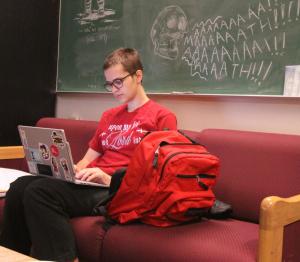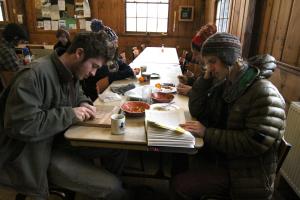Pop-up Class Fosters Daily Practice

One of the key outcomes of last summer’s “action planning group” discussions on curriculum was the suggestion to offer pop-up classes on emerging issues or events that students want to learn more about. Marlboro’s new writing professor, Bronwen Tate, rose to the challenge in November, responding to students interested in participating in National Novel Writing Month, known as NaNoWriMo.
“I was excited about the idea of supporting students taking on NaNoWriMo, but thought that it might be useful to open the course up to practices other than writing and to goals other than completing a full-length novel,” says Bronwen. She called the course Cultivating a Daily Practice, and invited participants to come up with clearly measurable daily goals for progress on any long-term project, from artwork to podcasts to math research. “Over the course of my own writing, I’ve become a big believer in the transformative power of gradual steady progress, and I wanted to share this with students.”
The class met weekly on Tuesday evenings, in the dining hall, with additional informal meetings hosted by several of the students throughout the week, all around campus. Bronwen developed a series of discussion and reflection questions for each week that asked students to focus on their practice in different ways, including the behavioral, artisanal, social, and emotional habits that sustain them.
“A big goal of the course was just getting students to step back a bit from the work they’re doing and think about how they do it: what works, what doesn’t, and really, where they can find greater joy in it,” says Bronwen. “How they can stick with it through moments of frustration and not get derailed.”
“This month was wonderful,” says freshman Xander Porter, who wrote five pages in her journal each day. “I learned so much about myself as a writer, a student, and a person. I will take what I learned in regard to my habits and use it for the next time I sit down to write a paper.”

“This class gave me a justification for spending time on something I ultimately found very rewarding and meditative,” says freshman Cedar Van Tassel, who brought woodworking tools to breakfast each day and carved woodblock prints. “Whatever I was working on was usually well received too, and this outside positive reinforcement seemed to be an uncommon part of many other people’s routines.”
The format encouraged students to set their own goals, and Bronwen found that many students felt more ownership and agency in their education as a whole. Students were consistently supportive and respectful of one another’s struggles, and the class had some valuable support and participation from other members of the community. President Kevin committed to a daily practice of reading poetry, “with a goal of reawakening the muse,” and math professor Matt Ollis sent weekly email updates with detailed charts of his math research progress.
“The invitation to observe and reflect on their own process has led to lots of little light-bulb moments,” says Bronwen. “At Marlboro, we’re small enough and nimble enough in our organizational structure that things can go from idea to course in just a few days. Pop-ups like this really let us take advantage of that.”
